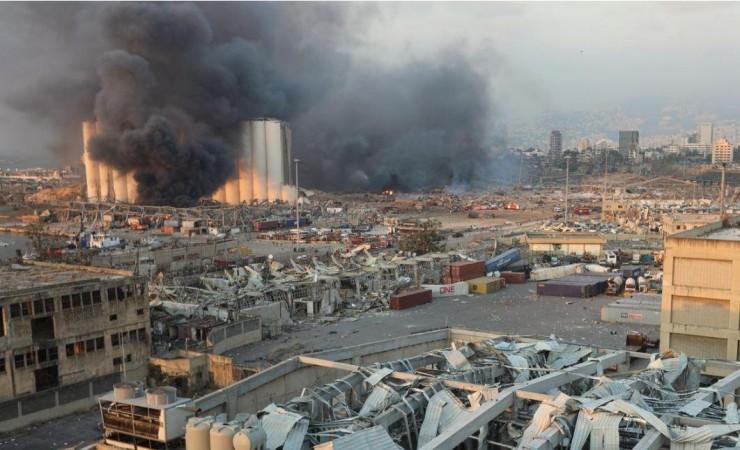As the visuals of Beirut explosion flashed across TV and computer screens on Tuesday evening, the entire world dreaded if it was another terrorist attack in the Middle Eastern nation of Lebanon.
The blast at Beirut port bore eerie resemblance to the 9/11 attack in the US. Like the twin tower attack, the building at the blast site in Beirut was destroyed after a huge explosion, thick cloud of red gas billowing from the blast.
While to relief, the blast didn't turn out to be a terrorist attack but it did cause massive damage to the already war-stricken Lebanon. More than 135 people were killed and over 5000 were injured.
So strong was the explosion that the blast was heard even 206 km away in Cyprus. Quoting Jordanian Seismological Observatory, Aljazeera Arabic said that blast caused a tremor that registered 4.5 on the Richter scale- the equivalent of a mini earthquake.
So what caused this blast?
Lebanon Prime Minister Hassan Diab blamed ammonium nitrate that was taken from a ship off the coast six years ago and was lying in a warehouse near the Beirut port.

What is ammounim natriate?
Ammonium nitrate (NH4NO3 ) is a synthetic chemical compound which is rich in nitrogen. On its own, it is not dangerous. But mixing it with other ingredients and presented with external factors, it can be used for various purposes.
Read all Beirut explosion related stories here
Ammonium nitrate, when mixed with water, can be used as fertiliser. In fact, due to its easy solubility and low production cost (Rs 4,868 to Rs 7,489 a metric tonne to produce), it is an ideal source of fertilizer for farmers and is made all over the world.
But when mixed with fuel and applied potential triggers, it becomes very dangerous. And because of this property, ammonium nitrate is used as explosive in mining.
Used in terrorist attacks
Because of its second property and inexpensive production cost, many terrorist organisations have used ammonium nitrate in their operations.
In India and around the world, terrorists used ammonium nitrate in several bombings including Pulwama, Varanasi, Malegaon, Bali, etc.
In the US, ammonium nitrate was used in the Oklahoma City bombing in 1995 in which a federal building was destroyed and 168 people were killed. It was the worst terrorist attack in the US until the 9/11 happened.
In that bombing, 2,300 metric tonnes of ammonium nitrate fertilizer was mixed with fuel and was used for the blast.

In comparison, Tuesday's Beirut explosion reportedly involved 2,700 metric tonnes of ammonium nitrate that was lying at the warehouse when the blast occurred, potentially causing 1000 times more harm.
What caused the blast in the Beirut
For an industrial blast like that of Beirut's to occur, experts say a lot needs to go wrong.
As mentioned earlier, ammonium nitrate itself is not dangerous but is unstable and will start to decay if left for a long time.
"The real problem is that over time it will absorb little bits of moisture and it eventually turns into an enormous rock," says Andrea Sella, professor of chemistry at University College London, in an interview to BBC.
This in combination with oxygen (an element necessary for combustion) released in the process and presence of combustible material nearby makes it very dangerous.
If placed near high-temperature either by detonator or a flame nearby, the bonds holding ammonium nitrate can violently breakdown on its own. It then releases expansion of gases like nitrogen, oxygen and water vapour. If these factors are combined with a combustible material like fuel oil, an explosion happens.
The intensity of the explosion in such cases is huge.
As it is being reported in Beirut blast case, ammonium nitrate was lying there for the past six years giving it ample time to decompose. While the exact cause of the explosion is yet to be known, it can be suggested that the presence of explosive material and fire nearby would have set off the explosion.
How dangerous is the gas
On blast, ammonium nitrate release a massive amount of toxic gases like nitrogen oxides and ammonia gases which causes respiratory problems. Nitrogen dioxide (NO2) is a red, bad-smelling gas which has been associated with air pollution.

And as the visuals of the Beirut explosion showed there were huge reddish plumes of gases covering the city it is going to be there until there is rain or it naturally dissipates.
Regulation
Because of its possible use for industrial explosive, ammonium nitrate is highly regulated in India, the US and Europe.
Its production, storage and transportation are guided by country-specific laws.
In India, Ammonium Nitrate rules, 2012 regularises any activity related to ammonium nitrate to prevent its misuse.















